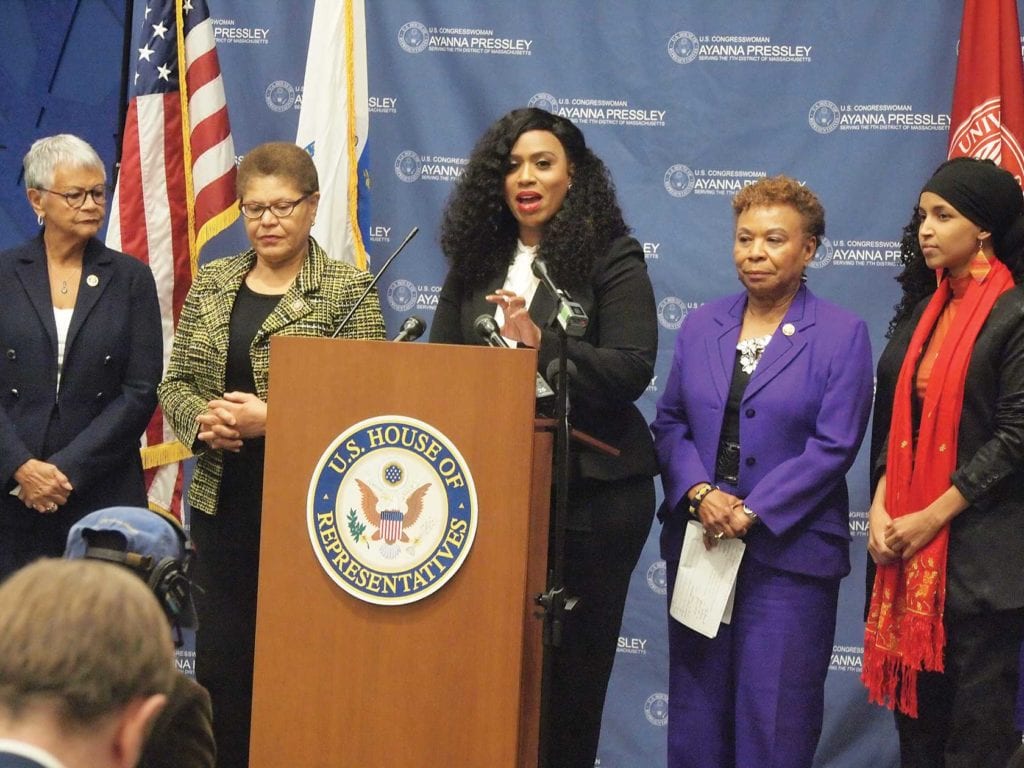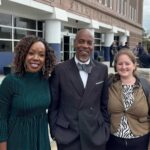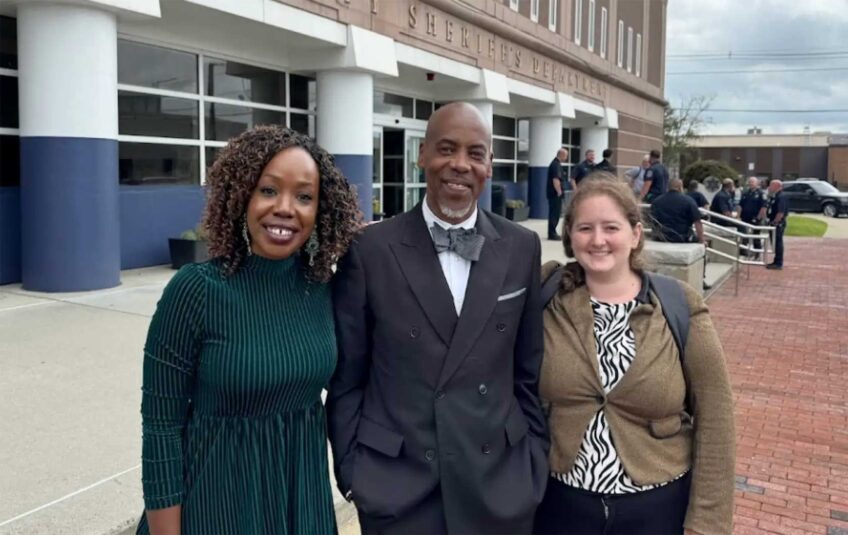Congressional Black Caucus meets in Boston
Discussions center on criminal justice, equity issues

The Congressional Black Caucus made a historic visit to Boston last weekend to address the country’s systemic inequality and economic injustice. A press conference held Friday at Northeastern University’s John D. O’Bryant African American Institute commenced the “State of Black America” series, where various elected officials acknowledged America’s continuing racial disparities and advocated for progressive reforms.
“During these unprecedented times that we find ourselves in, they really do demand unprecedented leadership,” said Rep. Ayanna Pressley. “At a time when black people are disproportionately paid less and arrested more, activism is not an option — it is a mandate.”
Pressley called out key issues plaguing the black population: deeply embedded xenophobic, racist, and discriminatory systems, she said. She promoted the Caucus’s work and recognized its value in Congress.
“We’re frequently referred to as the ‘conscience of the Congress,’” said Pressley. “Because we know that when the rest of America gets a cold, black folks get pneumonia.”
Jan. 10 marked the Caucus’s first ever visit to Massachusetts — an informative and celebratory occasion. Pressley said that too few people recognize the power and leadership of the Caucus, a 54-member council that seeks to empower marginalized communities and further protective legislation.
“The CBC’s role in combating hate, racial inequality and civil injustice remains important as ever as the Caucus fights for the most vulnerable,” said Pressley.
CBC Chair Karen Bass, a representative for California’s 37th district, was the first black woman in history to serve as the speaker of the California Assembly. Bass said that the Caucus is represented in the highest levels, exerting significant influence over the country.
“Oftentimes the Black Caucus and its achievements [are] truly the hidden figures,” said Ilhan Omar, a representative of Minnesota’s 5th congressional district and the first Somali woman in Congress. “We don’t often talk about the accomplishments that the CBC has made — the impact it’s made in this country, and how it’s shaped many of the policies that have garnered progress.”
Pressley expressed pride at serving alongside other Caucus members, whom she called “iconic table shakers” and “justice seekers.” She said that the Caucus is ushering in a new movement that “reimagines equity and justice” and advances the “dignity and humanity” of black Americans nationwide.
Barbara Lee, who serves as the vice chair of the steering and policy committee for the House of Representatives, has the distinction of being the highest ranking African American woman in the House, Bass noted. Lee has recently focused heavily on criminal justice reform and has urged the Department of Justice to release reports on women in prisons. Lee said that there has not been any data, nor report, on women in prison since 2000. Along with directing the Justice Department to conduct further investigation, she continues to look at alternatives to incarceration, she said.
Rep. Gwen Moore, the first black person elected to Congress from Wisconsin, said that she is eager to “gain insights and ideas on how to move forward out of this malaise.” She said that Wisconsin currently has the highest rate of incarceration of African American men.
The Caucus hopes to implement a “radical reimagining” of the criminal legal system, said Pressley. She hopes to achieve 80 percent decarceration by decriminalizing low-level offenses and mitigating the effects of the 1994 federal crime bill that expanded the use of mandatory minimum sentencing. Pressley said that the “Three strikes, you’re out” policy incentivized mass incarceration and expanded jails nationwide.
“I do not believe that mass incarceration has made any of us safer,” she said.
The Caucus also prioritizes equity in education. Lee said that 40 percent of African American kids in preschool are being expelled, beginning the “school to prison” pipeline that the Caucus hopes to crack.
“How do you expel kids in preschool?” Lee asked. “By the time they’re in elementary school, by the time they’re 5 and 6, they don’t even have a head start — they can’t.”
Rep. Bonnie Watson Coleman, the first black woman to serve as majority leader of New Jersey’s general assembly, encouraged appreciation for black women.
“For too often, and too long, that unique intersection of being black and female has just not been at the center of anyone’s attention,” she said. Watson serves as co-chair on the Congressional Caucus on Black Women and Girls, which was created in 2016.
Most of the issues prioritized by the Congressional Black Caucus go hand-in-hand with economic inequality. Pressley specifically recognized financial disparities throughout Boston. She said that from Cambridge to Roxbury — a 5-mile span — life expectancy drops by 30 years. Median household income plummets by almost $50,000.
“Although the 7th is one of the most diverse, vibrant, and dynamic districts in the country, we are also one of the most unequal,” said Pressley.
It is impossible to understand income inequality without understanding the impact of race, said Lee.
“If we only deal with economic inequality, and don’t address race as a factor, we will never be able to address liberty and justice and economic fairness for all,” she said.
Lee added that disproportionate numbers of African Americans are homeless or below the poverty line. She said that people need to prompt themselves to ask a pressing question: What causes these inequalities?
“Race is a factor in all of these disparities,” she said. It is also a factor in every institution, every policy, and every part of life.
Moore agreed. She referred to “The Black Power Imperative,” a book written by Theodore Cross. The book, said Moore, illustrates how “No matter how hard black people work, they would never, ever, ever, ever, ever be able to catch up economically unless we addressed some of the systemic and institutionalized racism.”
Inequality is visible throughout Boston, said Pressley, from universities to MBTA routes. A lack of generational wealth, she said, causes African Americans to borrow private loans for their education. To travel around the city, black people must ride a bus 64 more hours than white people per year.
On a positive note, Bass stressed the resilience of the black population.
“In all of the challenges that we’ve faced over all of these years,” Bass said, “we have managed not just to survive, but to thrive.”
Pressley recognized recent advancements throughout Massachusetts. Sumbul Siddiqui was just sworn in as mayor of Cambridge — the first Muslim mayor in Massachusetts history. Last year, Boston swore in the state’s first black police commissioner, William G. Gross.
This year will be pivotal for the Caucus, because of both the census count and the upcoming election. Lee recognized that the country still has a long way to go.
“While we’ve made progress, we all know that slavery, Jim Crow, segregation and institutionalized racism have made the state of black America unequal,” she said. “We must continue to address these systemic barriers and inequalities head on.”
Pressley agreed. “When you are ticketing, fining or arresting a person experiencing homelessness for skipping a turn-style so they can get to a shelter in time for curfew, there is no place for that in a just society.”
She shrugged off recent criticisms of her People’s Justice Guarantee, a resolution aimed at transforming the criminal justice system. Despite disapproval, she said, she is determined to end the “epidemic” of mass incarceration.
“When people have never seen or heard of something, it will make them uncomfortable,” she said. “I have no qualms about making people uncomfortable in the name of progress or justice.”






